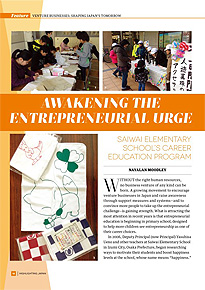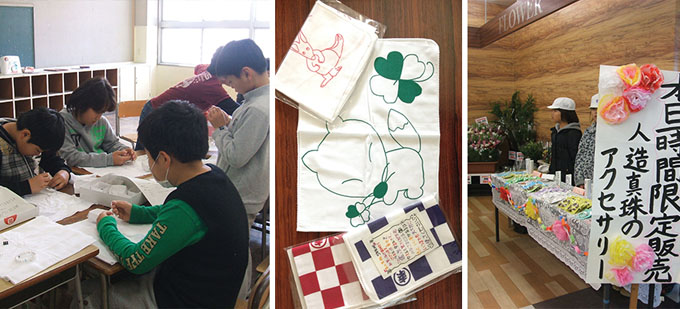Home > Highlighting JAPAN >Highlighting Japan September 2014>Venture Businesses: Shaping Japan’s Tomorrow
Highlighting JAPAN

Venture Businesses: Shaping Japan’s Tomorrow
Awakening the Entrepreneurial Urge
Saiwai Elementary School’s Career Education Program

Without the right human resources, no business venture of any kind can be born. A growing movement to encourage venture businesses in Japan and raise awareness through support measures and systems—and to convince more people to take up the entrepreneurial challenge—is gaining strength. What is attracting the most attention in recent years is that entrepreneurial education is beginning in primary school, designed to help more children see entrepreneurship as one of their career choices.
In 2006, Deputy Principal (now Principal) Yasuhisa Ueno and other teachers at Saiwai Elementary School in Izumi City, Osaka Prefecture, began researching ways to motivate their students and boost happiness levels at the school, whose name means "happiness." The entrepreneurship education program they created—called "Career Education"—teaches kids invaluable life skills and introduces the kinds of hardships and stress found in real-world working environments, as well as the joys, accomplishment and personal pride that success in business can bring. Ueno and his staff believe the ultimate goal of education and this program is to give children both the power to live happy lives and to make other people happy as well.
Career Education is part of the fifth-grade curriculum, and runs through the second half of the school year. It is an extremely realistic program with unique "simulated work" challenges. Experts who have started and run businesses participate, and the students have to learn firsthand what it is like to run a company, how companies work, and how to handle business relationships and other every facet of the business process, including the finances. The experts give workshops on other aspects of business as well, such as design, marketing, sales and market research.
"Through the program, our students have met adults who take pride in their work," Ueno notes. "Such role models have a great influence on their view of professionals and work. It is one of my missions to make such encounters between children and adults happen."
Students interact with local businesses to produce goods for sale. Based on what is available, like locally produced glass beads, artificial pearls, and cotton handkerchiefs and towels from the city's cotton industry, they design a variety of products developed according to the market research they conduct themselves. After deciding what and how many to manufacture, they place an order with their chosen supplier. In addition, the students form a company, complete with departments. Teachers interview students, and based on their skills and personalities place them in the departments that best suit them.
The company's first task is to collect funds, followed by the marketing and sale of their products. Asking their neighbors and others, they sell as many as they can to customers who preorder, and often sell the rest in a single day outside a local supermarket. While the goal of the program is not to sell the entire inventory, in most years they do, and it's a great motivator for the students to work harder.
The profits are used to improve school facilities and buy equipment and other supplies. After the Great East Japan Earthquake in 2011, Saiwai Elementary School also donated earnings to Ooyachi Elementary School in Ishinomaki City to help support recovery efforts in the disaster area.
Saiwai students pick up more than business skills in this course. Teachers say their attitudes are markedly different after the program: they are more communicative, courteous and confident in the way they conduct themselves. "Before and after the program, we ask the children how they feel about themselves," says Yuriko Katsuragi, who ran last year's program. "Some initially seemed to dislike themselves, but after discovering what they are good at or like to do, they get to love themselves."
Both Principal Ueno and the teachers at Saiwai Elementary believe the kids take these lessons with them through junior high and high school, and will eventually use them to become successful, improving not just their own lives but the lives of their families and those in community.
© 2009 Cabinet Office, Government of Japan






